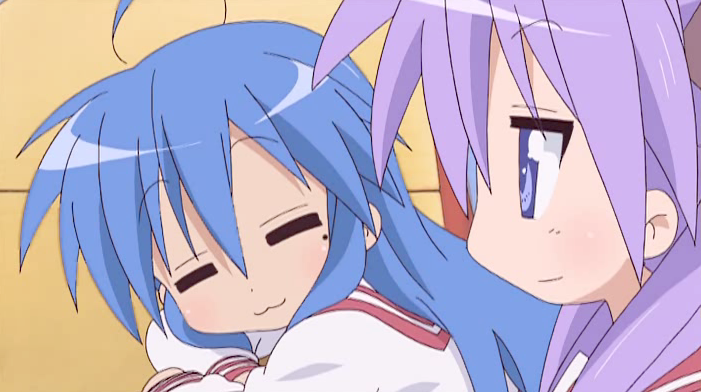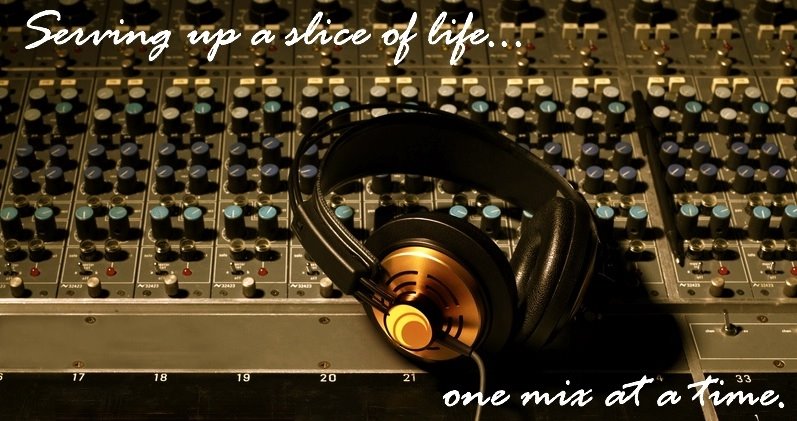
Genre: Slice of Life, Comedy, School Life
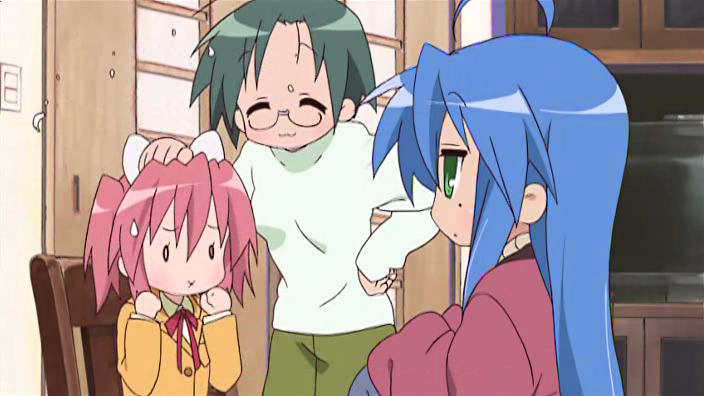
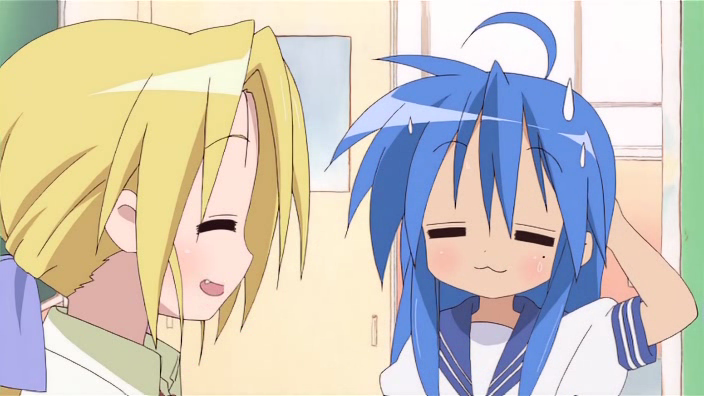
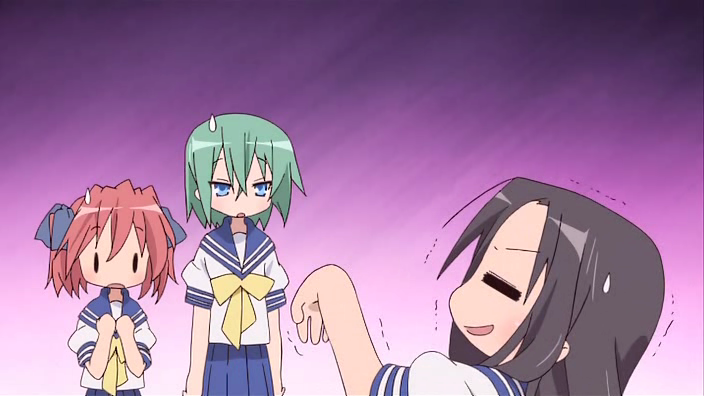
In the social circles that I frequent, I often claim myself as a very average anime watcher, watching the very slim pickings of shows featured on television the past several years. I grew up with the most popular ones on Toonami like Dragonball Z, Tenchi Muyo, Voltron, and Rurouni Kenshin. As I grew up and my interests changed, when Cartoon Network began their adult_swim lineup, I was exposed to anime with more mature themes such as Cowboy Bebop, Trigun, and sad to say, Inuyasha.
College and higher education rolled around soon thereafter, and I took an unconscious hiatus from the shows I once loved. I occasionally saw an episode of Samurai Champloo here and there, but my interests were straying more towards beer and girls than demons and kamehameha waves. The novelty of alcohol and booty calls began to waver, though I wasn't exactly sure how I managed to come across Lucky Star. It was perhaps that vast amount of praise/criticism it was being given at the time. Taking into account my rather generous open-mindedness, I dove right in. Regarded as the grandfather of moe anime, I surely was not ready for what I was going to be exposed to.
Story
Is there really a story to Lucky Star? Those expecting something truly great in terms of action, romance, or something truly life-changing should look elsewhere. Lucky Star focuses on the lives of four normal yet not so normal Japanese school girls; Konata the otaku, Kagami the tsundere, Tsukasa the scatterbrain, and Miyuki the walking encyclopedia. Episodes comprise the events of their daily lives and the absurd conversations they have during school and outside of school. The relatively slow/stagnant pace of the first episode is a good indication of the how the rest of the episodes will structured.Many people tend to characterize Lucky Star as the Seinfeld of anime, and for generalizing purposes, it does make some sense. It IS essentially a show about nothing, but what most newcomers to anime do not know is that it follows a tried and true formula of a typical slice-of-life anime. There are some characteristics that they both share, including the well-known roundabout conversations between characters, but where Seinfeld and Lucky Star divert from one another is in the plot the department. Despite the fairly random events that go on in the respective episodes of each series, the episodes of Seinfeld actually come full circle in one way or another. Lucky Star on the other hand simply compiles a set of random instances into an episode, with little or no continuity/cohesiveness.
Characters
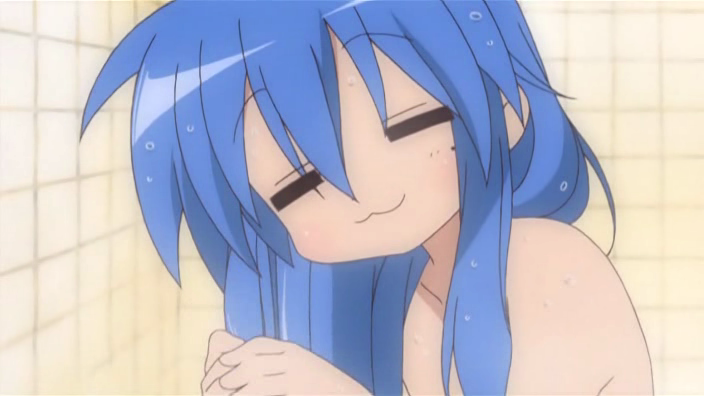 Izumi Konata: Idolized and worshipped by many for her otaku habits, the long blue hair, cat-like mouth, and sleepy eyes girl, how can she not be the main character? Can't really call her a protagonist, when there's no antagonist; unless one were to consider Kagami as one.
Izumi Konata: Idolized and worshipped by many for her otaku habits, the long blue hair, cat-like mouth, and sleepy eyes girl, how can she not be the main character? Can't really call her a protagonist, when there's no antagonist; unless one were to consider Kagami as one. 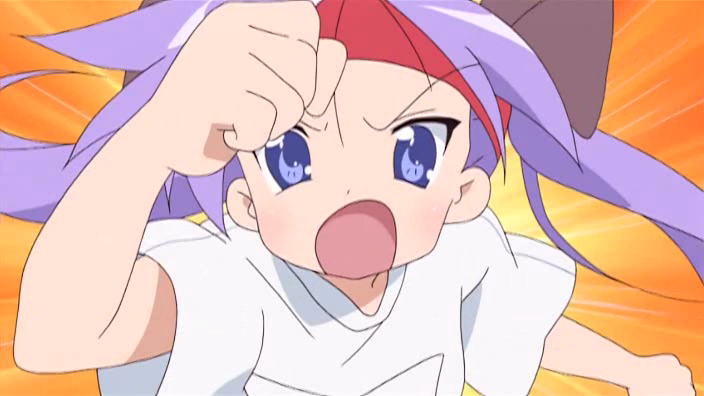 Hiiragi Kagami: The antagonist of the series, she's on the butt end of every jab Konata takes at her. The typical tsundere character, she's very brash and hot-headed, but probably the most level-headed and competent amongst the group.
Hiiragi Kagami: The antagonist of the series, she's on the butt end of every jab Konata takes at her. The typical tsundere character, she's very brash and hot-headed, but probably the most level-headed and competent amongst the group. 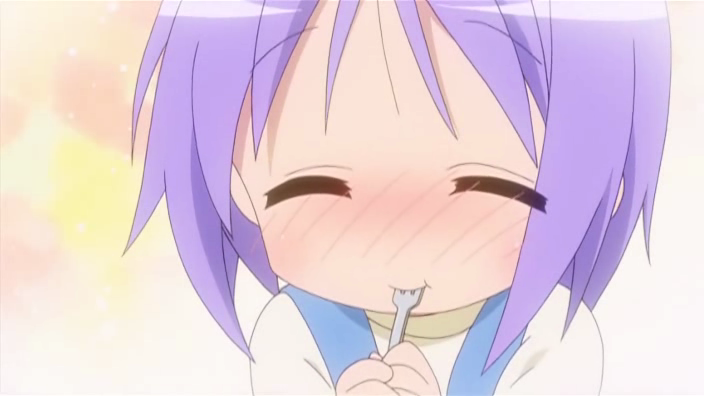 Hiiragi Tsukasa: Kagami's paternal twin sister. The less competent of the two Hiiragi twins, she's your pure moe character. Timid, shy, and lacking in life skills, she's very dependent on her sister to bail her out.
Hiiragi Tsukasa: Kagami's paternal twin sister. The less competent of the two Hiiragi twins, she's your pure moe character. Timid, shy, and lacking in life skills, she's very dependent on her sister to bail her out. 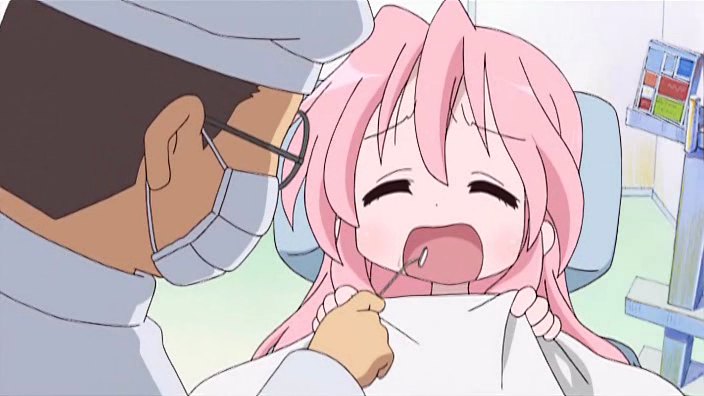 Takara Miyuki: The show's meganekko character, she always has a textbook definition of whatever Konata and the rest of the group discuss. Clumsy at times, she makes it up with her surprisingly nice body, which Konata will poke fun at constantly.
Takara Miyuki: The show's meganekko character, she always has a textbook definition of whatever Konata and the rest of the group discuss. Clumsy at times, she makes it up with her surprisingly nice body, which Konata will poke fun at constantly.The main cast and much of the supporting characters are of the archetypal variety. Not really dynamic or powerful characters, the cast of Lucky Star is likable at the very least. Kagami's classmate Misao and Konata's cousin Yui surely needed some more air time.
Voice Acting/Sound
The soundtrack of Lucky Star is pretty much lacking, recycling the same five to six tracks over the entire series. The ending credits portion of the show is fairly unique to Lucky Star as it often features Aya Hirano (Konata) singing karaoke to various anime themes, one being the famous "Cha-La Head Cha-La" opening theme from Dragonball Z. Despite the redundant and uninspired tracks, the ending credits section is noteworthy for its unique approach. The voice acting more than makes up for the lackluster music selection. Other than Aya Hirano, I wasn't familiar with any of the other seiyus, but was impressed with the cast as a whole. Special regards go to Emiri Kato for her role as Kagami; her reactions to Konata's incessant mockery/ridicule had me smiling the entire time--a true compliment to Aya Hirano.
Loved
Slice-of-Life-ness: Considering it as one of the most popular slice-of-life anime, it should excel in this department. As a college graduate, I definitely could draw some commonality between their experiences and my own; as much as an American guy can have in common with four Japanese girls I guess.
 Over the top Anime Vendor: Crazy spiky hair, obnoxiously loud and overdramatic voice acting, how can anyone not like this guy? He seriously needs his own spinoff series. A very entertaining parody showcasing the over-the-top extent of anime cinematography indeed. The pursuit of Legendary Girl 'A' continues.
Over the top Anime Vendor: Crazy spiky hair, obnoxiously loud and overdramatic voice acting, how can anyone not like this guy? He seriously needs his own spinoff series. A very entertaining parody showcasing the over-the-top extent of anime cinematography indeed. The pursuit of Legendary Girl 'A' continues. Hated
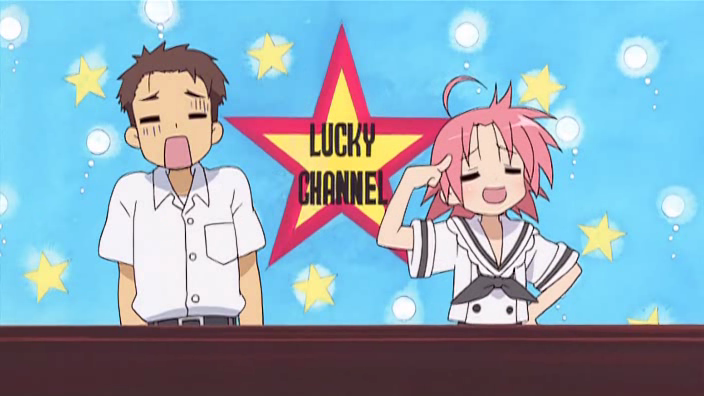 Lucky Channel: An odd/unnecessary additional segment at the end of each episode, I really could not understand the violent/abusive humor between the hosts Akira and Minoru. I often found myself skipping through parts of it, looking for the credits/episode preview. There is a part where the Lucky Channel actually gets interesting, but to keep this review spoiler-free, I'll leave it at that.
Lucky Channel: An odd/unnecessary additional segment at the end of each episode, I really could not understand the violent/abusive humor between the hosts Akira and Minoru. I often found myself skipping through parts of it, looking for the credits/episode preview. There is a part where the Lucky Channel actually gets interesting, but to keep this review spoiler-free, I'll leave it at that. Lost: For the most part one can relate to the everyday musings of Konata and company; but as Kagami often has trouble doing, Konata's incessant conversations referencing various types of anime may have audiences lost. A recommendation prior to watching Lucky Star is the first season of The Melancholy of Suzumiya Haruhi. You will appreciate the plentiful references it draws upon the show as a result.
The Lowdown: To be frank, Lucky Star brought me back to an entirely new set of anime to watch. Granted it wasn't the best one to start with, but it does have its qualities. Jokes are going to be hit and miss depending on how big of an otaku you are. Not exactly spectacular, awe-inspiring, or even engaging at times, one needs to be flexible to really appreciate its charm.
